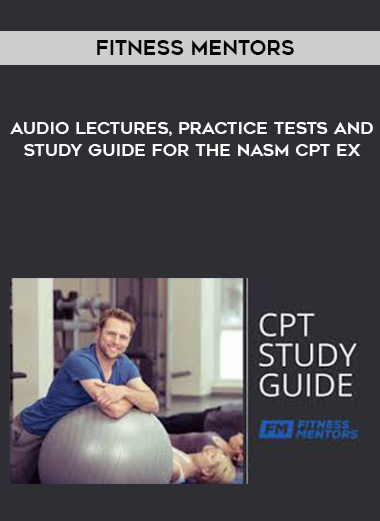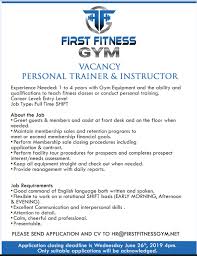
Consider these factors when looking for a career as part-time personal training. These factors include your education and pay scale. Additionally, consider the possibility of career advancement. These are just a few of the most important factors you should consider. This career path is the best choice if you love to work in fitness and help others.
Job description
Part-time personal training job descriptions should detail the responsibilities of a trainer. These tasks can range from designing individualized fitness routines for clients to cleaning equipment and enforcing safety rules in a gym. Personal trainers also have the ability to give advice on nutrition as well as lifestyle. It is necessary to be certified in this area to be eligible for a part-time personal training job. Certified personal trainers must also be proficient in CPR and first aid.
Part-time personal coaches should be flexible and willing to work multiple hours. They could be available during the day, weekends, or holidays. They may have to work long hours to develop a clientele or recruit new clients. They may also work in parks and local gyms or at the homes of their clients.

Education required
Personal training can be done with a variety of certifications. You may consider a degree or certificate in physical therapy and exercise science to pursue a career in the field. A graduate degree will give more freedom and allow you to specialize. These specialties include strength training. Nutrition, exercise theory, exercise theory, and functional movements. A master's degree is also available in personal training for a management position.
Personal trainers can offer a rewarding career opportunity, regardless of whether you are looking to work from home or help others. It is an excellent career option because it helps people reach their fitness goals. While you might be working part-time, you can still enjoy many of the same benefits that someone who is full-time.
Pay scale
The salary for a personal trainer is dependent on experience, number of clients and hours worked. The salary range for this profession is between $30k and 200k per year. A personal trainer may struggle to find enough hours to make the most from this career. Experienced trainers can earn anywhere from $30 to $50 an hr and charge up to $75 per hour.
This profession is highly rewarding. As a personal trainer, you'll be inspiring and motivating other people to achieve their fitness goals. Personal training offers many benefits and flexible hours, no matter if you are a working professional.

Career growth potential
Those who are seeking a career change should consider a part-time career in personal training. This career is flexible and offers the opportunity to grow rapidly. It's the perfect career for those with busy schedules or stay-at-home parents who want to make some extra money. While this career path has its challenges, there are many benefits.
Places to work
Personal training is a promising career option for those who are interested in pursuing a degree related to health or need a parttime job. As a personal trainer, you can inspire and motivate others to achieve their fitness goals. This is a highly visible career that provides great job satisfaction. You can also work part-time as a personal trainer and still get the full benefits of a permanent position.
FAQ
Do I need to get warm before going out?
Warming up before you start an activity will reduce muscle soreness. Warming up can take many forms, including walking, running or jumping rope, stretching, or cycling. Start slow and slowly increase your pace.
Is it possible to gain weight by exercising?
Not at all. Exercising can help you maintain your current weight. When you work out regularly, you'll build muscles and increase your metabolism, helping you burn more calories throughout the day. This means that you won't store so much fat.
Are there any exercises I shouldn't do?
Before beginning any new workout program, consult your doctor. You may have injuries or other medical conditions that prohibit you from exercising in certain ways. Certain activities require special equipment and training. Swimming, for example, requires swimming suits and access to the pool.
What happens if my sleep is not enough?
Insufficient sleep can cause your brain to not receive the signals necessary for hormone regulation and other chemicals involved in controlling appetite and metabolism. You may also gain weight and overeat. Insufficient sleep can lead to stress, which can cause overeating.
Exercise can I help me lose weight
Yes. Regular exercise will help you to lose weight by burning extra calories. Exercise also helps keep your metabolism up, so you continue to burn calories even when you aren't exercising.
How can I start with fitness?
Start small. Take 10 minutes each day to walk around your block. This will teach you the basics of movement and give your muscles time for adaptation. Once you are comfortable with this form of exercise and have gained some experience, you can start adding steps to your daily workout routine.
How many hours of sleep should I get every night?
The recommended amount of sleep varies depending on age, gender, and individual needs. Most adults need 7 to 9 hours of sleep per day. Teenagers and young children generally need around 10 hours of sleep each night. This number decreases as they age.
Statistics
- In 2018, the World Health Assembly agreed on a global target to reduce physical inactivity by 15% by 2030 and align with the Sustainable Development Goals. (who.int)
- One study showed that adults who watch more than 4 hours of television daily had an 80% higher risk of death from cardiovascular disease. (heart.org)
- In high-income countries, 26% of men and 35% of women were insufficiently physically active, as compared to 12% of men and 24% of women in low-income countries. (who.int)
- Globally, 28% of adults aged 18 and over were not active enough in 2016 (men 23% and women 32%). (who.int)
External Links
How To
How to Burn Belly Fats Quicker
When we are trying to lose weight, belly fat is often seen as a problem. If you look at it, belly fat is actually a positive thing. It's the amount of fat stored around your stomach that protects your organs from getting damaged. So let's see how to burn belly fat fast.
Lack of exercise and stress are the main reasons we store body fat. Because stress stimulates the release of cortisol hormone, it makes us hungry all the time. Cortisol can increase insulin levels in the blood. The insulin stores the excess calories as fat. A lack of sleep leads to adrenaline being released into the system which causes an increased appetite. These extra calories can easily be lost through exercise.
There are many options to reduce belly weight. You can choose to try any of these options, depending on your budget. Here are some tips to help you get rid of belly fat quickly.
-
Eat less food. Don't eat three large meals at once. This will help you consume less calories.
-
Drink plenty of fluids. Water flushes out toxins in your body and helps you stay hydrated. Drinking water before meals will help you feel fuller for longer, so you don't overeat.
-
Avoid eating unhealthy snacks. If you're looking for quick fixes, snack foods like chips, cookies, candies, etc. It might sound tempting. These fattening treats are best avoided as they have too many empty calories and sugar. Instead, choose healthy alternatives like fruits, veggies, nuts, seeds, and whole grains.
-
Strength training should be performed at least 3 times per week. Strength training builds muscle mass and burns more calories when you're not working out. Strengthening your bones, muscles as well ligaments, joints, tendons, heart and lungs.
-
Stretching and walking are good habits. Stretching can improve flexibility, mobility, and reduce back pain. Walking is great for burning calories.
-
Reduce alcohol intake. You should cut down on alcohol consumption. It adds no nutritional value to your diet.
-
Slowly lose weight. To lose weight, the first step is to determine what your current weight. Then, add 5% to 10% to your body weight to get your ideal weight. Once you have established your ideal weight, reduce your daily calorie intake by 500 to 1000 calories each day until you achieve your goal.
-
Avoid processed foods. These foods contain high levels of sugar, salt, and preservatives. Even though they can be very convenient, these foods lack sufficient nutrients to support your health.
-
Don't skip breakfast! Breakfast is good for your concentration, memory, and energy. Include protein (like eggs) and fiber, like oats, in your breakfast.
-
Have regular bowel movements. Constipation and irregularity can cause gas and bloating. To prevent this, drink plenty of water and increase fiber intake.